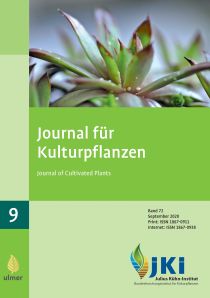Solanum mealybug <em>Phenacoccus solani</em> Ferris, 1918: New in Germany!
DOI:
https://doi.org/10.5073/JfK.2020.09.04Keywords:
Solanum mealybug, potential virus vector, climatic change, ornamental plantsAbstract
Scale insects (Insecta, Homoptera, Ord. Sternorrhyncha, Subord. Coccina) are often thermophilic species that, as a result of global warming, are currently expanding their geographic distribution towards the poles. Within the mealybugs (Superfam. Coccoidea, Fam. Pseudococcidae), several species, which are of great importance as virus vectors in viticulture in Southern Europe, attack ornamental plants in greenhouses in Central Europe. It can be expected that these species will also colonise Central European vineyards as global warming progresses.
In this context our newly described finding is remarkable in that the mealybug Phenacoccus solani, which is known from grapevines in North America and Asia, has overwintered (2019–2020) outdoors on ornamental plants in the Palatinate wine growing region.
The species cannot be determined with the Central European identification literature and was therefore identified by molecular techniques using bio barcode primers. The diagnosis was generated within the context of the establishment of a national reference laboratory for insects at the Julius Kühn-Institut.
Published
Issue
Section
License
The content of the journal is licensed under the Creative Commons Attribution 4.0 License. Any user is free to share and adapt (remix, transform, build upon) the content as long as the original publication is attributed (authors, title, year, journal, issue, pages).
The copyright of the published work remains with the authors. The authors grant the Journal of Cultivated Plants, the Julius Kühn-Institut and the OpenAgrar repository the non-exclusive right to distribute and exploit the work.







